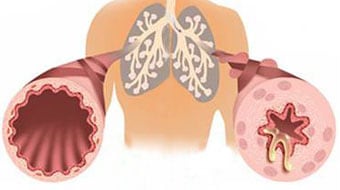With the greater attention given to celiac disease in recent years, researchers have been better able to piece together the complex association between celiac disease and several other conditions. One of these associations, found by a recent and comprehensive study, includes celiac disease and asthma.
Celiac disease is an autoimmune disease triggered by gluten, a protein composite found in the triticae tribe of cereal grains like wheat, barley and rye. Despite common misconceptions, celiac disease is not a food allergy, so eating gluten doesn’t always trigger an immediate reaction. But it is an insidious and dangerous autoimmune disease. The only known cure for celiac disease is a strict life-long gluten-free diet.
Asthma is a chronic inflammatory disease of the lungs. Common asthma symptoms include coughing, chest tightness, shortness of breath and wheezing. Currently, scientists believe asthma owes its origins to a blend of environmental variables and genetic predispositions.
How Celiac Disease and Asthma Correlate
The study to which I’m referring, led by Dr. Jonas Ludvigsson, was conducted by Orebro University Hospital and the Karolinska Institute in Sweden. It was published in the Journal of Allergy and Clinical Immunology, and it compared more than 28,000 people diagnosed with celiac disease (verified with biopsy) to more than 140,000 similar people without celiac disease.
The study discovered that people diagnosed with celiac disease were 60% more likely to develop asthma than the general population. The researchers adjusted for three well-known risk factors: birth via cesarean section, high body mass index, and smoking. Even with these risk factor adjustments, celiac disease significantly raised the risk of developing asthma.
The study also found that asthma developed in celiac disease patients earlier in life compared to when it developed in the general population.

Note that this study suggests an association between celiac disease and asthma, not that one causes the other. If you’re familiar with how I cover things in the Gluten Intolerance School, I encourage readers to appreciate the difference between correlation and causation.
Is Vitamin D Deficiency In Celiacs to Blame?
In an email received by Reuters Health regarding the study, Dr. Ludvigsso suggested that vitamin D may explain the association: “Personally, I think the role of vitamin D deficiency should be stressed.”
Vitamin D deficiency plays a critical role in the development of both osteoporosis and tuberculosis, two conditions common in people with celiac disease. And some research suggests a vitamin D deficiency, along with early gluten exposure and gut bacteria, may play a significant role in the development of celiac disease in babies.
Ludvigsson suggested that if a person with celiac disease also suffers from a vitamin D deficiency, it could negatively impact the immune system, thus increasing the asthma risk. Because of the way celiac disease behaves — in people with celiac disease gluten triggers an autoimmune response where antibodies damage and inflame the lining of the small intestine, reducing their ability to absorb vitamins and minerals — it isn’t uncommon for newly diagnosed patients to suffer from various vitamin deficiencies.
However, Dr. Ludvigsso also noted that celiac disease and asthma may share some other immunological feature.
The study did not address any connections between asthma and a wheat allergy or a non-celiac gluten sensitivity.
If you have either celiac disease or asthma, I suggest you discuss this association with a qualified medical professional. Vitamin D supplementation may be discussed, and if you have asthma you might discuss a careful gluten challenge to see if it helps relieve symptoms.
I don’t mean to cause alarm about celiac disease and asthma, but it is another opportunity to catch something too often missed.
I have read anecdotal evidence that people suffering from asthma have experienced relief from a GFCS diet (gluten-free, casein-free diet). However, this is a strict diet that may create several nutritional deficiencies if not implemented correctly, so only try this diet under the guidance of an experienced dietitian or medical professional.
Source:
Journal of Allergy and Clinical Immunology, 2011. doi:10.1016/j.jaci.2010.12.1076

